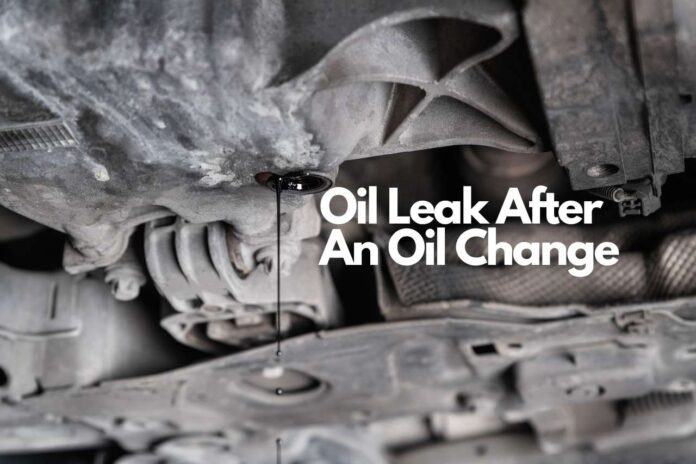Alongside fuel and coolant, oil is among the three crucial fluids that enable a car to run. One of the simpler parts of the vehicle to maintain is the oil filter and the oil, which will aid in keeping the engine robust if it is routinely replaced.
One of the easier auto maintenance tasks is changing the oil and filter. Still, occasionally even the simplest tasks may go wrong. After an oil change, there can be a moment when oil is dripping from your car. So you might be thinking about the leading cause of an oil leak after an oil change? If this occurs, you must identify the underlying cause so that it may get immediately repaired.
How Do You Know If You Have An Engine Oil Leak?
There are a few distinct signs when oil is leaking. The dashboard’s oil warning light indicates that the vehicle’s oil level has decreased to the point that it may interfere with the engine’s operation. It is the one that could get seen from within the car. It is better to locate the oil spill before the dashboard warning light flashes because this indication only turns on before the oil level has fallen relatively low.
A greasy, dark fluid is the best sign of oil spilling on the floor beneath the car. You can assume it’s a transmission fluid leak if the fluid is pink, and a coolant leak if the liquid is green. Finding oil here implies an oil spill’s presence and location. The puddle that forms just beneath the oil pan and oil filter makes it simple to identify the source of an oil leak.
What Could Cause An Oil Leak After An Oil Change?
So, what causes an oil leak after an oil change? Don’t freak out if your automobile starts to leak oil after an oil change. This leak might be occurring for several reasons.
-
Damaged Oil Filter
Your car may leak oil when parked if the oil filter gets broken because the oil might leak as it travels through the filter and into the engine. Your automobile may also leak oil if the damage is to the oil filter’s pan rather than the filter itself. The oil pan may get damaged if traveling on lower-elevation roads or in locations with plenty of potholes because of repeated hard impacts with the road surface. This damage may lead to a sudden leak that starts when the vehicle stops and can worsen over time.
-
Oil Pan Plug Not Correctly Installed
If your vehicle is dripping oil, It can be since the oil pan stopper is not in the proper position while the car is parked. If threads are stripped, not placed correctly, or is not fully tightened, the oil pan plug may get harmed. This issue may get temporarily fixed by swapping the oil pan stopper for a rubber plug, an easy and affordable remedy since a steel plug will survive longer than a silicone plug. A permanent remedy usually entails changing the plug with one that is precisely the proper size for your car’s plug.
-
Excess Engine Oil
Oil leaks are indeed a typical sign of too much engine oil. Blue emission smoke, a potent burning odor, and a higher reading on the oil pressure monitor often come next. Using a dipstick tube, check the engine oil level. Hire a professional to execute a new oil change to eliminate extra engine oil.
-
Blown Head Gasket
If your automobile leaks oil when parked, it might be due to a burst head gasket or engine compartment seal. The rubber components used to seal your engine block may have deteriorated over time, and oil leakage from the front of the engine compartment might result from this.
-
Broken Gaskets
Another potential cause of an oil leak after an oil change is a cracked oil gasket or seal after parking. The heat produced while driving will cause the engine block and cylinder head to heat up when you drive slowly and park your car in a garage. When heated, metal parts expand, putting strain on gaskets and seals. An engine’s gaskets and seals get made to prevent oil leakage.
The metals, however, compress as the engine cools, leaving gaps between the seals and the metal parts. Because there isn’t enough pressure to prevent the oil from flowing, these spaces may cause an oil leak.
- Additionally, driving with little coolant can cause the engine to overheat. And a heated engine can cause the cylinder head to move and lose its form, which can cause an oil leak from the head gasket.
- If your car doesn’t have enough antifreeze to stop the water in the engine from freezing due to the cooler temperatures if you live in a location with really low temperatures, the machine might freeze and break. This can cause your automobile to leak oil when it is parked.
What Are The Measures That Can Be taken To Prevent An Oil Leak?
You may avoid leaks following an oil change by employing several preventative measures and recommended practices.
- Ensure that your car receives routine maintenance. Your skilled technician can check for any indications of damaged seals and faulty components. He will soon be able to see any early indications of an oil spill.
- Never put off changing your engine’s oil. And while doing so, be sure to tightly close the oil drain cover and the oil filter cover to avoid any oil spills.
- The oil drain valve and the oil filter cover should not get overtightened. Doing this prevents you from damaging them during the subsequent oil change, resulting in a big oil leak.
Final Thought
Changing your engine’s oil at the proper intervals is crucial to preserve its life. Above mentioned are some causes of an oil leak; hopefully, this post has provided you with a solid foundation for finding the problem.
